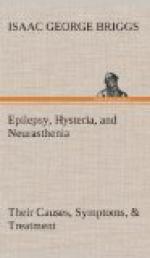Children should be taught these habits as soon as they can eat, for the custom of a lifetime is easy.
* * * * *
CHAPTER XI
DIGESTION
“We may live without poetry, music
and art;
We may live without conscience, and live
without heart;
We may live without friends, we may live
without books,
But civilized man cannot live without
cooks.”
The human digestive system consists of a long tube, in which food is received, nutriment taken from it as it passes slowly downwards, and from which waste is discharged, in from sixteen to thirty hours afterwards.
Six glands pour saliva into the mouth, where it should be—but how rarely is—mixed with the food, causing chemical changes, and moistening the bolus to pass easily down.
The acid Gastric Juice, of which a quart is secreted daily, stops the action of the saliva, and commences to digest the proteins, which pass through several stages, each a little more assimilable than the last.
The lower end of the stomach contracts regularly and violently, churning the food with the juice, and gradually squirting it, when liquified to Chyme, into the small intestine. If food is not chewed until almost liquified, the gastric juice cannot act normally, but has to attack as much of the surface of the food-lump as possible, leaving the interior to decompose, causing dyspepsia and flatulence.
Most people suppose the stomach finishes digestion, but it only initiates the digestion of those foodstuffs which contain nitrogen, leaving fats, starches and sugars untouched.
By an obscure process, the acid chyme stimulates the walls of the bowel to send a chemical messenger, a Hormone through the blood to the liver and pancreas, warning them their help is needed, whereupon they actively secrete their ferments.
The secretion of the pancreas is very complex. It carries on the work of the saliva, and also splits insoluble fats into a soluble milky emulsion.
Fats are unaffected in the mouth and stomach, which explains why hot, buttered toast, and other hot, greasy dishes are so indigestible. The butter on plain bread is quickly cleared off, and the bread attacked by the gastric juice, but in toast or fatty dishes, the fat is intimately mixed with other ingredients, none of which can properly be dealt with. Always butter toast when cold.
To continue: The secretion of the pancreas also contains a very active ferment, which, on entering the bowel, meets and mixes with another ferment four times as powerful as gastric juice, which completes the digestion of the proteids.
Meantime, the secretions of Lieberkuehn’s glands (of which there are immense numbers in the small intestine) are further aiding the digestion of the chyme, while the liver (the largest and most important gland in the body) sends its ferments, and the gall-bladder its bile, which further emulsifies the fatty acids and glycerin until they are ready to be absorbed.




